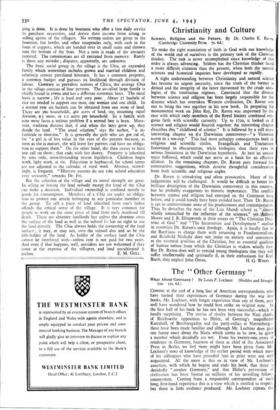Christianity and Culture
Science, Religion and the Future. By Dr. Charles E. Raven. (Cambridge University Press. 7s. 6d.) To make the right association of faith in God with our knowledge of the world and of ourselves is the primary task of the Christian thinker. The task is never accomplished since knowledge of this order is always advancing. Seldom has the Christian thinker faced a more difficult situation than the present, when both the natural sciences anti historical inquiries have developed so rapidly.
A right understanding between Christianity and natural science has become an urgent necessity, since the truth of the former is denied and the integrity of the latter threatened by the crude ideo- logies, of the totalitarian regimes. Convinced that the divorce between science and religion has been largely responsible for the disaiter which has overtaken Western civilisation, Dr. Raven sets out to bring the two together in his new book. In preparing his monumental work on John Ray, Dr. Raven was imprested by the ease with which early members of the Royal Society combined reli- gious faith with scientific curiosity. Up to 172o, it looked as if science and religion would flourish together. An interesting chapter describes this " childhood of science." It is followed by a still more interesting chapter on the Darwinian controversy—" a Victorian siorm in a tea-cup." This had most unhappy consequences both in religious and scientific circles. Evangelicals and Tractarians fraternised in obscurantism, while biologists shut _their eyes to serious limitations in the Darwinian hypothesis.. At best an uneasy truce followed, which- could not serve as a basis for an effective alliance. In the remaining chapters, Dr. Raven puts forward his constructive suggestions, which deserve thoughtful consideration from both scientific and religiou-s angles. .
Dr. Raven is stimulating and often provocative. Many of his judgements will be challenged. It would be 'difficult to .better his brilliant description of the Darwinian controversy in this country, but he probably exaggerates its historic importance. The conflict between science and religion had emerged on the Continent long before, and it could hardly have been avoided here. Then Dr. Raven is apt to underestimate some of his predecessors and contemporaries. Thus he describes the men of the Lux Mundi salon! -as. "Almost wholly untouched by they influence of the sciences," "Of4)10brey Moore and J. R. Illingworth in their essays on " The Christian Doc- trine of God " and " The Incarnation and Development " outline in essentials Dr. Raven's own theology. Again, it is 'hardly fair to the Barthians to charge them with returning to Fundamentalism, and Reinhold Niebuhr does not insist on anxiety and uneasiness as the essential qualities of the Christian, but as essential qUalities of human nature from which the Christian is seldom wholly free. But Dr. Raven does well to remind young theologians that they will suffer intellectually and spiritually if, in their enthusiasm for Karl


























 Previous page
Previous page